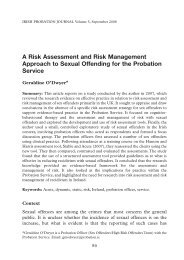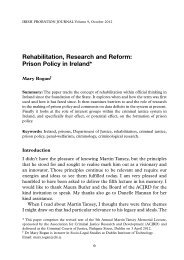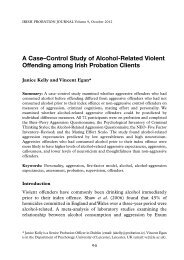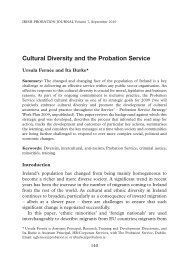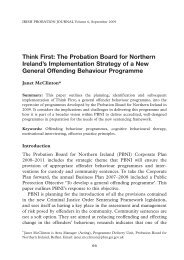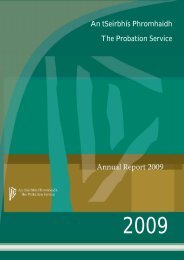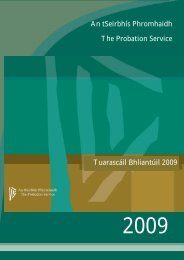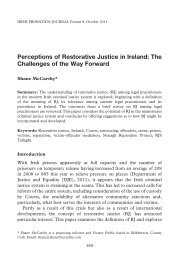Homeless Offenders Strategy Team (HOST) - The Probation Service
Homeless Offenders Strategy Team (HOST) - The Probation Service
Homeless Offenders Strategy Team (HOST) - The Probation Service
Create successful ePaper yourself
Turn your PDF publications into a flip-book with our unique Google optimized e-Paper software.
<strong>HOST</strong> Business <strong>Strategy</strong> 2004-2007<br />
<strong>The</strong> research also highlighted the implications for the work of the PWS in<br />
offender supervision and integration in the community caused by<br />
homelessness and related issues. <strong>The</strong>se include the difficulties in:<br />
tracking offenders who are homeless and living in transitory or temporary<br />
accommodation, the often disproportionate amount of time spent by<br />
probation officers addressing crises caused by homelessness, finding<br />
accommodation for people who often present with challenging behaviour<br />
(as well as compounding issues such as mental illness, substance misuse<br />
and so on) and who may be stigmatised by the nature of their offending<br />
(e.g. sexual violence). <strong>Homeless</strong>ness also makes compliance with<br />
supervised community sanctions, such as probation or community<br />
service, more difficult for the service user. At the same time, it is<br />
generally in the interests of the offender and society as a whole, to make<br />
community based sanctions as available as is practicable to homeless<br />
offenders. Custodial options, while necessary in a proportion of cases,<br />
can serve to make integration of the homeless offender ultimately more<br />
difficult. A clear implication for the PWS is the need to maximize<br />
partnership working to address such complex problems as offending and<br />
homelessness and facilitate offender access to mainstream services. For<br />
those who do have custodial penalties imposed, the implementation by<br />
the IPS of an advanced system of Positive Sentence Management should<br />
contribute significantly to planning for and implementing prisoner<br />
reintegration more effectively.<br />
Over the course of recent years the government has formulated a strategy<br />
to develop a comprehensive response to homelessness, incorporating the<br />
broad spectrum of matters relating to this issue including accommodation,<br />
health and welfare, education, training and preventative measures. This<br />
strategy is set out primarily in the three documents; <strong>Homeless</strong>ness - An<br />
Integrated <strong>Strategy</strong> (2000), Youth <strong>Homeless</strong> <strong>Strategy</strong> (2001) and the<br />
<strong>Homeless</strong> Preventative <strong>Strategy</strong> (2002). <strong>The</strong> response of the <strong>Probation</strong><br />
and Welfare <strong>Service</strong> to homelessness and related issues, as they impact<br />
on offenders and the wider community, is fundamentally informed and<br />
founded on these three strategies, in conjunction with the mission,<br />
strategies and business plans of the <strong>Service</strong> itself, those of the Department<br />
of Justice, Equality and Law Reform and the Irish Prison <strong>Service</strong>. <strong>The</strong><br />
<strong>Homeless</strong> <strong>Offenders</strong> <strong>Strategy</strong> <strong>Team</strong> (<strong>HOST</strong>) was established following<br />
publication of the <strong>Homeless</strong> Preventative <strong>Strategy</strong> with the purpose of<br />
assisting homeless offenders. <strong>The</strong> National Economic & Social Forum<br />
(NESF) Report on the Re-Integration of Prisoners (2002) has also made<br />
an important contribution to the approach taken in this area of work.<br />
8



